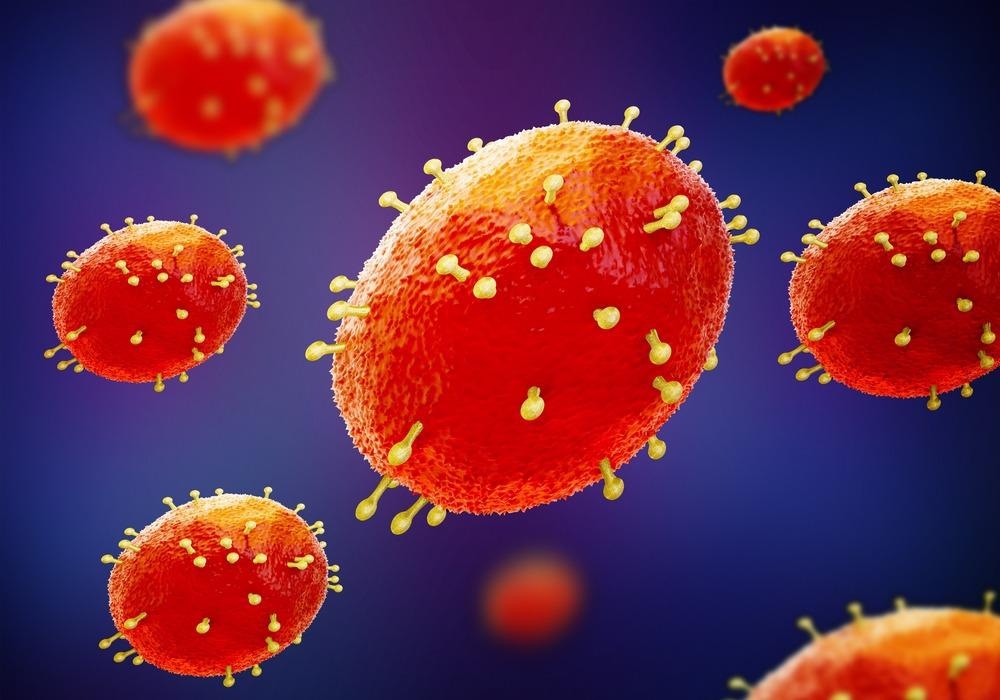Monkeypox (MPX) is an Orthopoxvirus that is endemic in Central and West Africa. It is not surprising that MPX cases have been reported in many countries including the United Kingdom, given its long incubation period and the gradual increase in travel that has occurred after the relaxation of restrictions due to the coronavirus disease 2019 (COVID-19) pandemic.
Nevertheless, the present MPX outbreak is not typical, as many cases are unrelated to travel. Furthermore, an increased prevalence has been noted in men who have sex with men (MSM). A new Journal of Infection study discusses the transmission of MPX through sexual contact.

Study: Transmission of monkeypox virus through sexual contact – A novel route of infection. Image Credit: MIA Studio / Shutterstock.com
Background
The U.K. Health Security Agency (UKHSA) recently documented a case that bore all signs of a classic case of imported MPX in an individual who had recently arrived to the U.K. from Nigeria on May 7, 2022. Several other cases have been identified in the U.K., wherein individuals were symptomatic before this first individual was identified to have MPX.
Seven cases of MPX have been reported in the U.K. between 2018 and April 2022. Alarmingly, more than 20 cases were already reported in May 2022 alone, which is when the current study was published.
Research has shown that MPX is primarily transmitted through close skin-to-skin contact from active lesions and bodily fluids. It has previously been suggested that transmission during sexual intercourse could be possible; however, the present study claims to report the first case with the documented transmission of MPX through sex.
About the study
Two white British men (patients 1 and 2) were the subjects of this study. They had not recently traveled outside the U.K. and reported no history of travel to regions with endemic MPX.
Patient 2 reported having controlled human immunodeficiency virus (HIV) and was receiving antiretroviral treatment at the time of his illness. Both patients were otherwise healthy.
Patients 1 and 2 were the receptive and insertive partners, respectively, when they had unprotected sex in April 2022. Patient 1 reported kissing a third individual with a crusted oral lesion ten days earlier.
Study findings
Patient 1 reported perioral white spots and painful perianal lesions twenty-four hours after sex, while patient 2 reported perioral papules on the mons pubis and penile shaft forty-eight hours after sex. The papules later evolved into painful ulcers.
Neither patient reported prodromal symptoms. Skin lesions were followed by fever, headache, and diarrhea.
The initial diagnosis was severe infection with varicella-zoster virus (VZV) or herpes simplex virus (HSV), with an additional bacterial infection. High-dose oral antiviral and antibacterial medications were administered to both patients.
Patient 1 reported no genital lesions and the cutaneous lesions remained in the perioral and perianal areas. For patient 2, ulcers were observed in the oral region, whereas other symptoms remained in the pubic and genital regions. The lesions were indicative of skin-to-skin sexual contact.
Both patients deteriorated and were ultimately admitted to the hospital, where they were subsequently prescribed intravenous ceftriaxone. Patient 2 reported new lesions, whereas patient 1 showed marked improvement.
In May 2022, the UKHSA published images of cutaneous MPX lesions that appeared similar to those identified in one of the patients. Subsequently, the hospital authorities liaised with UKHSA and the diagnosis was confirmed when the samples tested positive for MPX.
Both patients were systemically well during their stay at the hospital, did not report fevers, had normal white blood cell counts, and their inflammatory markers were slightly raised.
Conclusions
The results presented in this study are significant, as they bring into focus previously unaffected communities and healthcare workers (HCWs) who might be at high risk of MPX infection. Sexually active individuals of all age groups are expected to be affected.
The implications for HCWs are that they should be provided with appropriate protective equipment, education, and treatment, when needed, as the MPX virus is a category 3 pathogen. In the future, it will be also crucial to have sensitive community engagement and prevent the stigmatization of groups with higher incidence rates.
Journal reference:
- Heskin, J., Belfield, A., Milne, C., et al. (2021) Transmission of monkeypox virus through sexual contact – A novel route of infection. Journal of Infection. doi:10.1016/j.jinf.2022.05.028